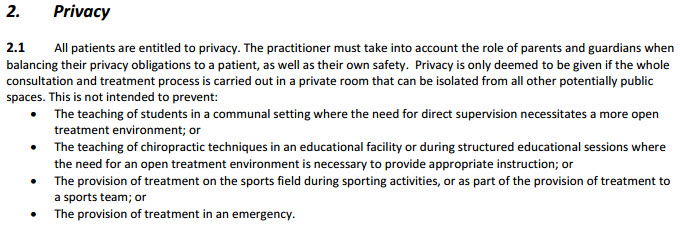New Zealand Chiropractic Board Adopts Restrictive Policy

Open Adjusting No longer Allowed
In a letter to registered chiropractors in New Zealand, Dr. Bruce Adam (a Palmer Graduate and pictured to the left) outlines the process the New Zealand Chiropractic Board followed in adopting an Ethical Policy that no longer allows for consultation or management of patients in an open adjusting environment.

The following is the text of his letter:
---------------------------------------------------------------------------------------------------
Fellow colleagues,
The Board has received communications both for and against the recent adoption of the privacy policy in the Code of Ethics. We thank you for your input. The Board is also aware of communications to the profession from the New Zealand Chiropractors’ Association (NZCA).
The previous version of the Code of Ethics was adopted by the Board in 2004, it was time to review the Code and ensure it reflected the needs of the public and the profession in 2013. There were two rounds of consultation with the profession during the review process. Responses were received during both rounds and these responses were carefully considered by the Policy Committee. The Policy Committee is chaired by a Board member and the committee members include a representative from the New Zealand College of Chiropractic, a representative from the NZCA, and a lay member.
The Policy Committee held a two day face to face meeting reviewing the submissions and the Code. From this the Policy Committee made recommendations to the Board.
The Board carefully considered the Committee’s recommendations, the importance of privacy and confidentiality during the treatment process, and the responsibility that the profession has to the public as a primary care provider involved in the mainstream public health care system.
Contrary to the impression given by the recent NZCA communication this is not a punitive measure. The Board’s action is in no way aimed at any particular type of practitioner or practice, and the Board can see no reason why all types of chiropractic technique can’t be provided in a private and confidential manner as alluded to by the Health and Disabilities Commission Health Code.
The Board is governed by the Health Practitioners Competence Assurance Act 2003, which has the principal purpose of protecting the health and safety of the public. This is a balanced Board, committed to acting in the interests of the NZ public. The Board members represent a cross section of the profession. We have chiropractors that have graduated from Canadian Memorial, National College and Palmer College in the USA, RMIT in Australia and the NZ Chiropractic College and geographically they practise on the North Shore of Auckland, South Auckland, Gisborne, Wairarapa and Christchurch.
The two lay members; one is a family lawyer from Wellington and the other is chief executive of an NGO community organisation, represent very strongly the interests of the NZ public.
The provision for patient privacy and confidentiality is considered paramount by the Board to public safety. Privacy in consultation and treatment rooms allows for the patient to be able to openly and confidentially communicate with their chiropractor. In the non-private clinical settings there is a risk that a patient would be unable or uncomfortable in communicating openly about their personal condition. Continued open communication between patient and chiropractor is essential to all stages of treatment.
The policy states:
All patients are entitled to privacy. The practitioner must take into account the role of parents and guardians when balancing their privacy obligations to a patient, as well as their own safety. Privacy is only deemed to be given if the whole consultation and treatment process is carried out in a private room that can be isolated from all other potentially public spaces. This is not intended to prevent:
* The teaching of students in a communal setting where the need for direct supervision necessitates a more open treatment environment; or
* The teaching of chiropractic techniques in an educational facility or during structured educational sessions where the need for an open treatment environment is necessary to provide appropriate instruction; or
* The provision of treatment on the sports field during sporting activities, or as part of the provision of treatment to a sports team; or
* The provision of treatment in an emergency.
The Board will have an opportunity to discuss any concerns about this matter with the NZCA at an MOU meeting on the 19th May.
The Board trusts that this communication will clarify the purpose and rationale for the privacy section in the Code of Ethics. If you have any questions or comments regarding the Code of Ethics please feel free to contact the Board Registrar, Angela Sinclair at 04 474 0703 or registrar@chiropracticboard.org.nz. All communication received on this matter will be considered and discussed at the next full meeting of the Board on the 19th May.
Kind regards,
Bruce Adam
Chair
----------------------------------------------------------------------------------------------------
Dr. Adams nor the Board provided any evidence to support its contention that patients must be isolated or that patients cannot consent to an open adjusting format. Nor did the board provide for exceptions where the individual patient who requests or needs it could be offered privacy as is the convention in chiropractors' offices practicing in this fashion.
What evidence does the Board have that open arrangements affect disclosure, or for that matter, confidentiality?
In reviewing the evidence we did not find anything to support such a claim. However, we did find articles supporting open consultations.
Apparently it’s OK for MDs:
Other practitioners do it, and publications suggest that it is a positive thing:
Group Healing: Tired of waiting for a doctor? Shared medical appointments could be the answer.
"This is not a novelty; it's really a necessity for saving primary care."
By the way - the New Zealand Board considers chiropractors as Primary Care Providers.
There can be little doubt what the actual reason is for outlawing open adjusting in chiropractic. This is just one more example of the control that the Chiropractic Cartel has on the profession and how they will stop at nothing - even the ridiculous - in order to impede the ability for subluxation centered chiropractic to get to the masses.
The New Zealand Chiropractic Board should provide the evidence that supports their premise. They are in favor of evidence informed practice, aren’t they? You can't govern a profession based upon unsubstantiated speculation, can you?
Don't hold your breath.
Blogs
- The Chiropractic Cartel: A Look Back at Bias in Accreditation and its Imact on Today's Profession
- Inside Montana's Chiropractic Monopoly: ACA & MCA's Brazen Board Takeover
- Concerns Grow About Control of the NY State Chiropractic Board by the ACA - Use of X-ray in NY Under Threat
- Reproductive Health Information and Chiropractic Care: Navigating New Privacy Regulations
- Navigating Substance Use Disorder (SUD) Consent: What Chiropractors Need to Know














